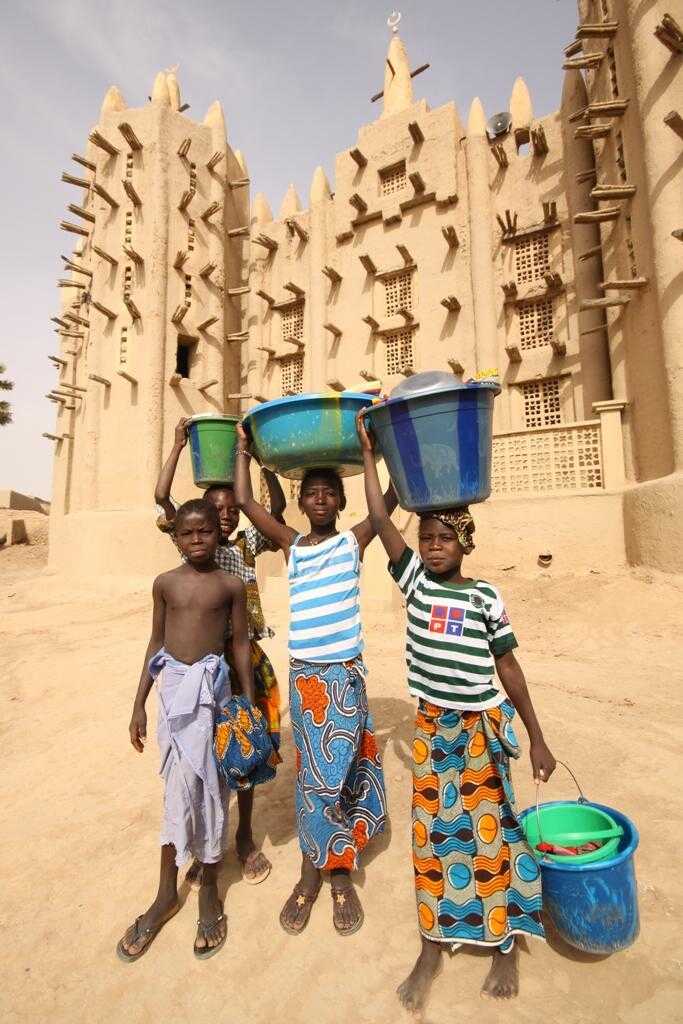
Figure 1.--Islam reached Mali during the medieval era. Here we see Malian children in front of traditional mud mosques. Most Malian people today are Muslim and Islam is an important part of their culture. |

|
Mali is a strongly Muslim country and Islam plays a major role in society and daily life. The amcient pre-Islamic religion was animist. These communities prayed to the Spirit of the Land asking them to increase the growth and harvest of the crops. This is an ancient traditional belief, which is still followed by many Mali people.
Trade with the Arab north through caravan trails across the Sahasra brough Islam (13th century). The area of modern Mali was ruled by Muslim emperors. Gradually the common people accepted the new faith, although they never entirely gave up their traditional animist faith. Slowly and gradually, Islam became the dominant religion of the country. Important Islamic universities were establisged in Mali. Islam is now dominant religion of the country. Some other religions also exist in Mali, especially the western region. Something like 95 percent of the populastion is Muslim. The others practice Chrtistianity or traditional animist cults. This strong Islamic faith has a major impact on the country's culture.
The ancient pre-Islamic religion was animist. These communities prayed to the Spirit of the Land asking them to increase the growth and harvest of the crops. This is an ancient traditional belief, which is still followed by many Mali people. The village chief was believed to have direct associations with the spirits. This lent authority and status to the village leaders. By honoring their leaders they were pleasing the spirits. The villasge chief was thus both a secular and religious figure.
Trade with the Arab north through caravan trails across the Sahasra brough Islam (13th century). Islam was thus introduced by Arab traders who brought not only trade goods, but their religion. Sundjata founded the Mali Empire and from that point most of the rulers in Mali were Muslim. Gradually Ialamization filtered down to the common people as they accepted the new faith, although they never entirely gave up their traditional animist faith. And trafitional rlements have sirviced, much as the same phenonemon is observable in African Christianity. Slowly and gradually, Islam became the dominant religion of the country. Important Islamic universities were established in Mali. This included renowned Islamic universities in Timbuktu, close to the Niger River, and Djenne on the Bani river, a tributary of the Niger. This was just as Renaisance was beginning in Europe and great universities were founded which eventually addressed other sub\jects besides religion. The universuties in Mali never evolved beyond Islamic studies.
Moroccan explorer Ibn Battuta describes his travels through the Mali Empire (1351-52). He tells that the Malian are very devote Muslims, reading the Koran and prayong. Ibn Battuta was, however, shocked by their custom: "The servant and slave woman, and young girls go about in front of all men full naked, with genitals exposed� All the women go into the sultan's presence naked and without coverings, and his daughters also go about naked."
Ibn Battuta was disturbed that the slave women went "in front of all men full naked, with genitals exposed". According the Muslim scholars the 'awarah' of a slave woman in front of men outside the household are only the pelvis. He was also surprised that little girls went completely naked. Surely little boys also went naked, but that was not a problem in Mali or in other Muslim countries at the time. Ibn Battuta was scandalized when he saw that free women went naked in Sultan's presence. This presumably was the result of pre-islamic traditions.
Islam is now dominant religion of the country. Something like 95 percent of the populastion is Muslim. This strong Islamic faith has a major impact on the country's culture. Especially as Islam is much more thana relgion in Westerb terns, wirg spill overs into culture, government, law, and politics.
Some other religions also exist in Mali, especially the western region. The others practice Chrtistianity or traditional animist cults. The ancient traditional beliefs are still followed by many Mali people, often intermingled with Islamic elements. Unfirtunately fundamentalist Islam is on the rise throughout the region. And Iskamic extremists are very intolerant. Thus vilence has falred. There is also an element of ethnic rivalry. One prepess reports descrines the vilence in 2019. "A raid on a village in central Mali on Monday left at least 95 people dead in the country’s latest bout of violence linked to Islamic extremists. Gunmen began shooting, pillaging, and burning the Dogon village of Sobame Da in the early morning hours, local news outlets reported. Ali Dolo, the mayor of the district, told Reuters the death toll could still rise because only 50 of the village’s 300 residents responded to a roll call. No group claimed responsibility for the attack, but unrest peaked this year between the Dogon hunters and the Muslim Peuhl Fulani herders. In March, suspected Dogons killed more than 150 people in Fulani villages in the country’s deadliest attack yet. Some Peuhl leaders had vowed to carry out retaliatory attacks for the killings in March. Members of the Dogon group accuse the Peuhl of supporting jihad, while the Peuhl say the Dogon support the Malian army’s attacks on them." [Ohikere]
Ohikere, Onize. "Religious, etgnic violence escalates in Mali," The Sidt (June 11, 2019).
Navigate the Boys' Historical Clothing Web Site:
[Introduction]
[Activities]
[Biographies]
[Chronology]
[Cloth and textiles]
[Clothing styles]
[Countries]
[Topics]
[Bibliographies]
[Contributions]
[FAQs]
[Glossaries]
[Images]
[Links]
[Registration]
[Tools]
[Boys' Clothing Home]
Navigate the Boys' Historical Clothing national pages:
[Return to the Main Malian page]
[Return to the Main African page]
[Algeria]
[Angola]
[Burkina Faso]
[Congo]
[Ethiopia]
[Gabon]
[Ivory Coast]
[Kenya]
[Lesotho]
[Mali]
[Somalia]
[South Africa]
[Uganda]
[Zimbanwe]
